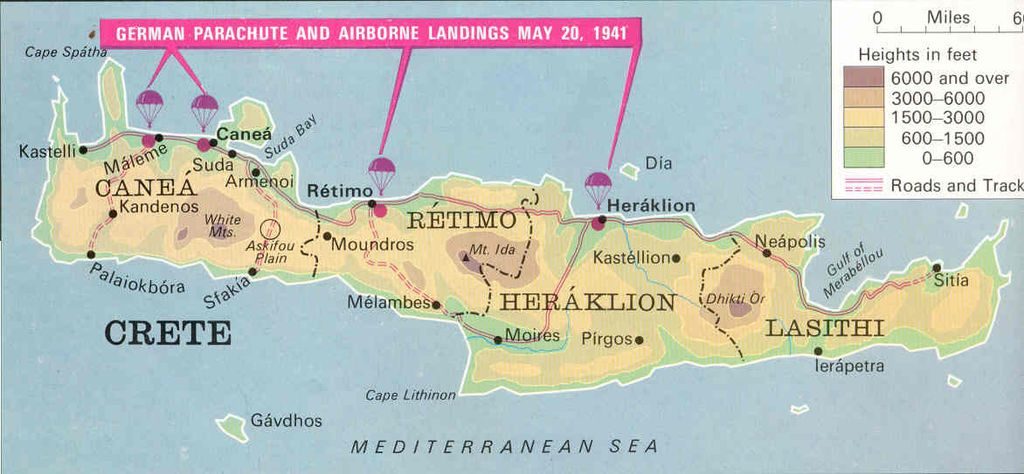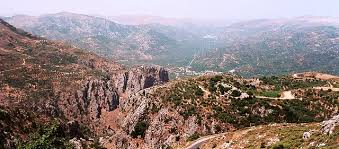Martin Bora is a police officer now in the Wehrmacht, assigned to the German embassy in Moscow in 1940 from whence he is dispatched to Crete on the whim of a superior to fetch some Cretan wine. The early scenes in Moscow are interesting period pieces as the allies of convenience dance around each other.

Equally fine are the descriptions of the heat and light in Crete, after the chilly gloom of Moscow. While the weather is different, the social atmosphere in Crete under German occupation is as tense as that in Moscow.
The simple errand of finding the wine and escorting it back balloons out as readers knew it would.
The Germans have only just secured the island.
 The German airborne invasion.
The German airborne invasion.
The Greeks have surrendered and the British have once again been driven into the sea, but there are still many British soldiers at large in the hills and dales, and some Cretan armed resistance has begun. It is much more dangerous than Moscow.
In the midst of this volatile situation a British prisoner claims a war crime has occurred and produces photographic evidence of the murder of a household of civilians. Hmm. Best to investigate this ourselves is the German conclusion, and do so before the International Red Cross takes an interest. It would have been a refreshing change from the stereotypes, if one of the Wehrmacht generals wanted the truth to root out indiscipline among his men. Instead it seems one of the victims was an acquaintance of the egregious Heinrich Himmler (1900-1945) and the quickens the pace.
But with Crete largely subdued and the demands of the next offensive now in train, combat troops and field officers are being transferred and reassigned in rapid succession. Ergo the only Wehrmacht officer of sufficient rank with relevant experience who is not subject to a movement order is …Martin Bora.
It is a good set-up. Bora does what all good plods do and interviews the accuser and at the end of one of their discussions when they have sparred is a nice touch. Both are highly educated men and Bora speaks perfect English so has no translator, though there are guards present and many other prisoners milling about. The Brit decides to reveal a secret to Bore to help in the investigation but swears him to secrecy. Then just to make sure the word does not leak out he switches to Latin to provide the clue. Bravo.
Bora meets a local police officer who is resigned to German hegemony and an American archaeologist, a woman, becomes his unwilling guide. Both of these characters are rounded individuals.
To find an eye witness to the events shown in the photographs in the battered camera, Bora takes to mountains of the interior to find a British soldier who allegedly fled that way. In the course of this trek the descriptions of the flora and fauna, the heat and the light are excellent but they become repetitive and thereby frayed.
 It is a long way from the tourist resorts now on the coasts.
It is a long way from the tourist resorts now on the coasts.
Less palatable to this reader is Bora’s incessant need to feel sorry for himself, and bore the reader with his back story. How a solider who went through Poland and then France can be so inward looking is the mystery here. This is no Odysseus!
That he and the woman guide are at odds is well done, and unusual in this genre when the femme is usually either a fatale or a conquest. This one is not very femme though she does try to be fatale.
Bora’s meetings with those who have fled to the mountains and those who live there are uneven. The Catalonians he finds there are a cardboard plot device, period. Ditto the distant maidens in the field. Hardly more credible are the Cretan guerrilla band members. More convincing is another archeologist whom Bora finds at a dig in the mountains. Major Busch, Bora’s immediate superior, is also credible.
That Bora begins to think he is on an Homeric odyssey just seems silly. Likewise the resolution of the plot coiling back on itself is so far fetched it would take Apollo astronauts to bring it home. It is not what Aristotle would call a coherent plot.
By the way, the description on the Amazon web site, from which I acquired this book, errs on two counts. It is a not Red Cross representative who is murdered. Nor is Bora sent to investigate the murder, rather he is there when an investigation is needed and he is put to work.
 Ben Pastor
Ben Pastor
This title is part of series. Ben Pastor is a woman, one who writes about soldiers, she proclaims on her website.
Skip to content
